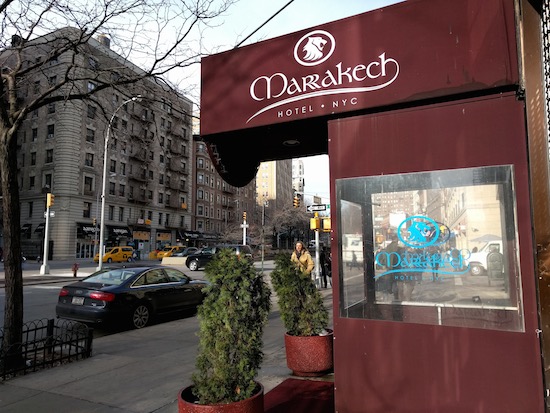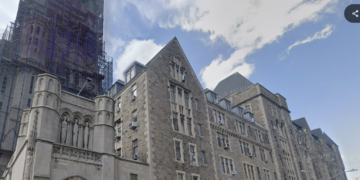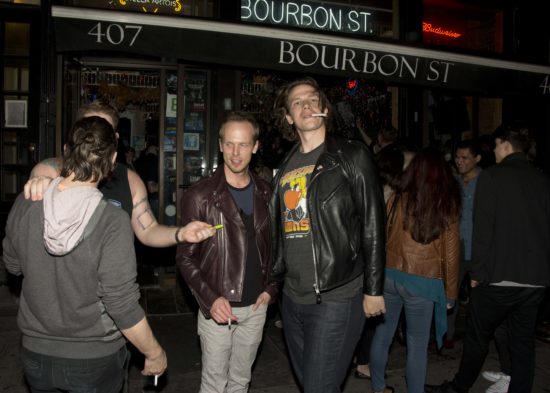
The Marrakech is one of the properties at the center of the case.
By Joy Bergmann
On Tuesday, Justice James d’Auguste decided not to decide whether Hank Freid must immediately cease operations of three hotels he owns on the Upper West Side: Marrakech Hotel [2688 Broadway at 103rd], Broadway Hotel [230 W. 101st between Broadway and West End Avenue] and Royal Park Hotel [258 W. 97th between Broadway and West End Avenue].
In late June, the City of New York filed a lawsuit against Freid and his affiliated real estate corporations alleging that the three hotels were operating illegally by providing transient accommodations to tourists rather than permanent housing to New Yorkers as required by the buildings’ Class “A” SRO [Single Room Occupancy] Certificates of Occupancy under the 2010 Municipal Dwelling Law [MDL].
In court affidavits, Freid and his attorneys admitted transient occupancy of the properties, but proclaimed such use to be legal, “All three Hotels were converted into transient hotels in the 1940’s and have been used continuously since as such,” and because this use was “entirely lawful prior to the MDL Amendments, they have pre-existing vested rights to operate their SROs on a transient basis, as a matter of law.”
Tuesday’s lengthy oral arguments regarding the City’s request for a preliminary injunction, however, appeared to demonstrate that the law in this area seems far from settled. Should WSR readers wish to review the jousting memoranda of law documents and dozens of exhibits in this case, please do. [You will reach the filings after entering the code information on the right side of the linked web page.]
Essentially, the City’s argument relies on MDL § 4(16) “When a class A multiple dwelling is used wholly or in part for single room occupancy, it remains a class A multiple dwelling.” MDL § 248 “A dwelling occupied pursuant to this [SRO] section shall be deemed a class A dwelling and… shall be occupied for permanent residence purposes.” MDL § 4(8) “A class A multiple dwelling shall only be used for permanent residence purposes,” meaning, for periods of 30 days or longer.
Further, the City cited a January 31, 2017, Appellate Court decision regarding Freid’s Royal Park Hotel that found that “none of the units” there may be used for transient purposes, adding that the most recent Certificate of Occupancy [CO] was the binding, deciding document. As WSR reported, a similar finding was made last year against the Imperial Court on West 79th Street.
Freid’s defense team – three firms and at least nine lawyers strong – pointed to decision by the City’s Environmental Control Board [ECB] on February 2, 2017, regarding Freid’s Broadway Hotel finding that its CO “legally permits transient use,” and that other documentation beyond a CO may be considered when determining a property’s lawful use.
Defense attorneys suggested that a “hybrid” designation of Class A (permanent use) and Class B (transient use) exists, is recognized by the Department of Buildings and applies here.
Justice d’Auguste said he was leaning toward ruling against the City in as far as an preliminary injunction forcing the hotels to cease operations while the case in chief moves toward trial. He expressed skepticism when City attorneys pressed the need to restore the 300 units to affordable housing. “I accept that this hotel use results in less available housing, but I don’t accept that ending hotel use now will return affordable housing to New York City,” he said. The more likely result? The owners would, “convert them to luxury apartments or homeless shelters, “ he said. “The owners would lose money on rent-stabilized apartments.”
The fact that other authorities had decided Royal Park Hotel could not be used for transient purposes, but Broadway Hotel could be [Marrakech Hotel was not discussed in detail] seemed to inspire the judge to offer an unexpected suggestion to both parties. “Is there a way to bring some finality to this suit, a potential win-win? Perhaps modify the CO in some buildings to keep hotel use, and others become housing?” he asked. “You folks chat, and in three weeks, tell me.”
Compromise didn’t seem a promising bet, according to conversations with attorneys immediately following the hearing.
“We felt very good about the hearing,” said defense attorney Ronald J. Rosenberg of Rosenberg, Calica & Birney. “We maintain that these buildings have been used legally and will continue to be used legally.”
“The parties at this point are pretty far apart,” said Catherine Wan, Deputy Director of the Mayor’s Office of Special Enforcement. “The City’s position is clear. Clear on the law with MDL, clear on the Certificate of Occupancy and clear on the [Appellate Court] decisions regarding [Royal Park and Imperial Court]. The City wants this to be permanent housing.”








1.] “All three Hotels were converted into transient hotels in the 1940’s and have been used continuously since as such,”–there are eras since the 1940s when I can’t imagine tourists booking rooms in this neighborhood.
2.] What were the buildings being used as when Hank Freid purchased them? Were there full bathrooms in every room? Were there communal kitchens? How often were the linens changed? What happened to the people who lived there? How long had they been living there?
3.] Justice d’Auguste said . . . owners would, “convert them to luxury apartments or homeless shelters, “ he said. “The owners would lose money on rent-stabilized apartments.”
There is something seriously wrong when a judge admits a landlord can make a profit on a homeless shelter but not on affordable housing.
Well said.
Why the judge cares about whether the owners make or lose money? He should care solely about whether a law was broken or not. It is very unsettling that the judge is thinking in these terms; after all most lawsuits about one party or another to lose money. But the point brought up above is the most valuable – the judge knows that the party will lose money on the affordable housing but not in shelters not to mention luxury housing. It becomes more concerning that the judge takes it into the account to make a decision.
Yes, Jen. One would hope the judge looks at the applicable law and precedent – higher than his court –
cases to make his decision.
From my reading, these hotels have long operated contrary to the letter of the law. So we residents can like the tourists being around, but do we like the idea of their being here as the result of someone flouting the city’s laws?
People have the right to make money, have a good return on their investment and be prosperous and successful. “Affordable” is one of the most hypocritical euphemism on the books: everything is “affordable” to someone and “unaffordable” to others.
The city’s current administration/city council vision: everyone is poor but they themselves continue to have great salary/insurance/perks/pensions paid by the taxes of the rich.
People have the right to make money, have a good return on their investment and be prosperous and successful, LEGALLY. You forgot an important word there.
Zoning laws are important. Otherwise, I can set up a tannery right next to you and you’ll probably be upset by that.
The building is zoned as a SRO, therefore it should be operated as an SRO. If the business owner doesn’t like it, then they should petition to change their zoning. Otherwise, they are breaking the law and should be shut down.
“The City wants this to be permanent housing.”
I find this quote troubling.
Why?
If these properties were converted into SRO hotels sometime back, then that is what the city wishes for them to remain.
Problem is (surprise, surprise) the laws regarding SRO hotels in New York are vary complicated and often confusing.
What is clear is that there are several ways for any hotel guest, including those staying in a SRO to become permanent tenants (with a RS lease).
https://rew-online.com/2016/02/25/understanding-single-room-occupancy-laws/
https://ny.curbed.com/2015/8/13/9931096/taxi-driver-scores-226-chelsea-rental-using-little-known-law
https://gothamist.com/2015/10/14/cabbie_gets_free_chelsea_apartment.php
As you may very well imagine owners of such hotels are not thrilled (to put it mildly) about their properties becoming permanent rent stabilized housing. However it is the law.
First was the WSR dig “Freid’s defense team – three firms and at least nine lawyers strong” Really necessary?
Does the WSR assume the City of New York’s legal department consists of one lone civil servant.
Two, regarding rent stabilization and “affordable” housing, yes there is a problem and NYC/NYS an or various court rulings are the reason.
RS like RC before it was *NEVER* intended to be an “affordable housing” scheme per se; indeed you can read statues creating both sets of laws and won’t find “affordable” mentioned.
Rather RS and RC were meant to address an “emergency” shortage of housing and or curb certain (as perceived) landlord abuses.
Over the years between changes in statue at renewal and or case laws that goal post has shifted. But here is the thing, current rent controlled and or stabilized apartments that are below market rent are only “affordable” to the long term tenants who inhabit. Once they are gone landlords will use various *LEGAL* means to bring rent up.
The city actually pays twenty to thirty percent or more above rack rates to hotels that take homeless. So yes, if there is a choice between renting an apartment permanently to a tenant at below market rates, versus obtaining more, far more from the city via homeless scheme, it becomes a no brainer.
This makes me angry. These hotels are bringing tourist dollars into the community, one of the few bright spots in an area that is SATURATED with homeless shelters. Around 2010, I believe, the city made illegal the backpacker hostels and hotels and then turned them into homeless shelters. The owners of those buildings were connected to those making those decisions (former city officials, I think) so it was totally corrupt and now what do we have? The largest concentration of homeless shelters in any part of the city, according to n90s.org. I know that this neighborhood has MARKEDLY deteriorated in atmosphere and sense of safety, especially at night, since the backpackers hotels were pushed out. We need legitimate tourist businesses here. You see those tourists shopping at Duane Reade, at the diners and food shops. Without these customers, even more of our commercial base would disappear.
we’re not even close to being “the largest concentration of homeless shelters in NYC.”
Oh I don’t know….
https://www.nytimes.com/interactive/2017/07/22/nyregion/nyc-homeless-shelter-maps.html?mcubz=0
cmon B.B. you’re an intelligent person. certainly you’re concerned with FACTS. and the facts show that we’re not even CLOSE to being the largest concentration of homeless shelters in NYC, or even in Manhattan.
let’s get rid of myths and fear-mongering,.
the link you provided doesn’t let you zoom in, but it should be obvious from the third map that the concentrations are in Upper Manhattan, the Bronx, and northern Brookyln.
here’s a recent description (but no map) which provides the same information:
https://www.ny1.com/nyc/all-boroughs/politics/2017/02/27/city-data-reveals-where-all-nyc-homeless-shelters-are-located.html
here’s another analysis of data that shows CB 7 in Manhattan is not even close to the highest:
https://www.dnainfo.com/new-york/20150824/belmont/map-10-community-districts-carry-bulk-of-citys-homeless-shelters
here’s a full report from the NYC Comptroller’s office in 2013 that shows that CB7 had 4 out of 74 shelters in Manhattan. the LOWer East Side had 15, Central harlem 22, E. Harlem 15. The numbers in the Bronx and Brooklyn were even more stark. CB4 in the Bronx had 31 shelters.
https://comptroller.nyc.gov/wp-content/uploads/documents/20130509_NYC_ShelterSiteReport_v24_May.pdf
this data is a little old but the numbers are even more extreme now.
thank you.
We don’t need more tourists here. We need more housing for those less fortunate. These are buildings that were built and zoned for that, if the owners don’t like those conditions, they can sell.
On balance, no, these hotels were not built for “low income” or whatever housing.
Large numbers if not all these places were built in the late 1800’s through early 1900’s as either transient or residential hotels that served various price points (first, second and third class).
Early as the 1930’s times, tastes and New York City were changing. Residential hotels began to decline in favor among the well off, and the hotel business overall would suffer from economic upheavals (recessions, the Great Depression, WWI and WWII).
As such many hotels were either torn down and property redeveloped (as with the Saint Andrews Hotel discussed in another thread), or busted down the ranks to a lower class of accommodation.
The rest is pretty much explained in this NYT piece: https://www.nytimes.com/2017/05/19/realestate/return-of-the-sro-with-a-twist.html
The hotel The Belleclaire, is a prime example: https://www.nytimes.com/1992/12/27/realestate/streetscapes-the-belleclaire-a-1903-home-for-the-homeless.html?mcubz=3
Hotel Martinique is another: https://www.nytimes.com/1988/12/27/nyregion/as-a-hotel-is-emptied-the-poor-move-on.html?pagewanted=all&mcubz=3
There were many more SRO hotels on the UWS and elsewhere, until the Koch administration came along. Depending upon which version of events you want to believe many do say Ed Koch turned a blind eye while connected real estate interests did all they could to empty out SRO hotels. Once cleared units were converted into permanent but not always “affordable” housing.
https://www.nytimes.com/1988/12/27/nyregion/law-halting-conversions-of-sro-s-does-little-to-help-poor.html?pagewanted=all
https://www.nytimes.com/1982/07/22/nyregion/koch-wants-sro-hotels-barred-from-j-51-program.html
https://www.nytimes.com/1989/11/28/nyregion/supreme-court-won-t-review-sro-ruling.html
To be fair there is a large number of persons past and present who feel the large number of SRO hotels on the UWS has been keeping the area down. As such were quite happy to see many of them go.
Does this “large number of persons past and present who feel the large number of SRO hotels on the UWS has been keeping the area down” get to make this determination?
This is a neighbourhood not a mental institution or a poverty relief center. Walk down Broadway. I don’t need more people who were selfish and irresponsible and now can’t take care of themselves here. More “homeless” disheveled guys in urine and excrement stained pants holding their junk and leering at me from the top of the subway stairs at 93rd St after my long day at work is not what I or anyone else needs, ever. I’ve known people like this personally before anyone starts to virtue signal about “the homeless” and “the less fortunate”. Live with these people yourselves first, and I mean literally. Take them into your homes and into your apartments and then we can sit and talk.
I’ve lived on W. 102nd for over 14 years and frequent the 96th and 102nd St. stops and have never once seen a homeless person (or anyone) do what you describe at the 93rd St. exit from the subway or anywhere else in this neighborhood. I don’t know what fantasy world you live in but you should take the advice of the other commentators and get your facts straight.
You know where I did see what appeared to be a homeless man shit on the street in NYC? In 1996 at 17th and Irving where I lived in the mid 90s. But never anything remotely like this on the UWS and not anywhere in NYC since that day.
As far as the issue at hand, the guests at the Marakesh are annoying as hell, congregating in front of the Starbucks and blocking the sidewalks, but I’ll take that any day over another SRO. There are enough in the neighborhood as it is. And as annoying as they are, the tourists do help keep the neighborhood businesses open. And there are too many empty storefronts here as it is.
What are you talking about?
If you recoil are the specter of seeing a homeless person (as it seems you do) then you should want SROs, not close them.
You have a clear misunderstanding of what an SRO is and I think you should learn more about them before you talk about them in such an uneducated manner.
CleanupNYC likely is referring to how SRO hotels became the de facto dumping ground, or whatever for mentally ill persons.
When the wave of deinstitutionalizing the mentally ill began in the 1970’s those people were supposed to be moved into supportive housing. Well New York State like others largely has failed to create anywhere near enough such beds.
In response mentally ill ended and still do end up in SRO hotels. Remember under the creation of Medicaid such persons are “disabled” and thus get checks every month. Something many SRO owners know and more than a few in past have taken horrible advantage.
Am not going to post links/give full details as am sure persons are sick of my long posts, but there was an owner of SRO on or near Riverside drive who did just that. He would cash residents checks and then take a good portion in *fees*. He also was accused (and IIRC proven in court) to beat and or otherwise intimate residents with a bat.
Don’t think many would object to SRO hotels that catered to the working poor or even lower middle class. There certainly is a need with rents going through the roof. But the warehousing of the poor and or mentally disabled is another matter.
They can sell, or they can apply to have the properties rezoned; OR they can assert their ownership rights and litigate against economically damaging regulation.
Given the choice, I would prefer hotels to homeless shelters for the neighborhood.
But I would be interested to learn more, however, about the defendants’ “…pre-exisiting vested rights…”.
Haven’t bed-and-breakfasts pretty much been legislated and regulated OUT of existence in Manhattan, due to changes law, regulations and enforcement thereof? After having been allowed to operate for decades, and after having operated as tax-paying businesses for decades? The law CHANGED, and these businesses were not able to assert “pre-existing vested rights” to operate. They simply had to close.
Properties are valued mostly by their current zoning. Purchasing something on the hopes NYC will grant a variance or whatever is pretty wishful thinking, especially under the current mayoral administration.
There actually is a law in place (since 2015 and renewed this year for extension) by NYC banning hotel to condo or whatever conversions:
https://therealdeal.com/2017/06/28/rebny-fighting-de-blasios-hotel-conversion-moratorium/
That obviously factors into the purchase price for a property
Only places not affected are properties where such conversions can take place as of right.
https://nypost.com/2017/08/22/hotel-wales-future-uncertain-after-selling-for-35m/
https://therealdeal.com/2017/08/23/famed-hotel-wales-could-be-heading-for-a-condo-conversion/
Bravo Jannie!!
No one on today’s UWS wants to live in an SRO. Get real!
New people continue to move into the neighborhood every day.
Yes they do. And they appear to be lawyers and bankers in very expensive big spaces. The singles from the suburbs tend to stay in their tiny spaces average on average 3 years. They come in from NJ and LI with their parents to look and have very specific requests as to where they want to live. The lawyers and bankers stay until after the second kid is born. Only the above 50 crowd who complain about everything on this WSR live in rent stabilized heaven.
Sean, but if lower=priced SRO housing were available, people who are NOT lawyers, bankers, and singles from the suburbs would move in to them.